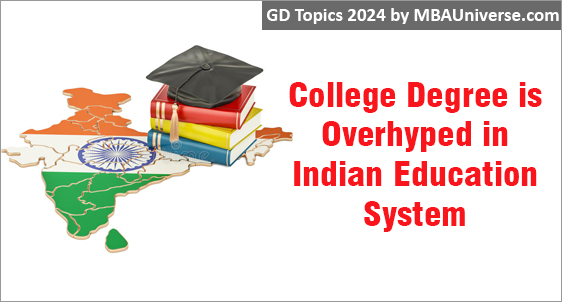
In 2022, addressing a conference on National Education Policy 2020, Prime Minister Modi stunned the audience full of educators when he said that Indian Education System has emerged from slavery and college degrees are overrated. Since then the GD Topic ‘College Degree is Overhyped in Indian Education System; has appeared many times as MBA GD Topic. MBAUniverse.com presents both sides of this debate.
College Degree is Overhyped in Indian Education System
The pursuit of a college degree has long been considered a cornerstone of academic achievement and career success in the Indian education system. However, in recent years, there has been growing debate surrounding the perceived overhype of college degrees. While some argue that a college degree is essential for socioeconomic mobility and professional advancement, others contend that it is overvalued and fails to adequately prepare students for the demands of the modern workforce. This GD Topic explores both sides of the argument, presenting points and examples that support the statement that "Yes, a college degree is overhyped in the Indian education system," followed by points and examples supporting the statement that "No, a college degree is not overhyped in the Indian education system."
Yes, College Degree is Overhyped in the Indian Education System:
1. Credentialism and Job Market Saturation: Credentialism refers to the tendency of employers to place excessive emphasis on formal qualifications such as college degrees, leading to an oversupply of graduates competing for limited job opportunities.
In fields such as engineering and management, where there is a surplus of graduates, employers often require additional certifications or specialized training to differentiate between candidates with similar academic qualifications. The proliferation of diploma mills and degree mills, which offer substandard degrees for a fee, has further devalued the credibility of college degrees in the job market. According to media reports, more than 50% of MBAs and Engineers lack employability. So, what is the value of College Degree, people ask?
2. Skills Mismatch and Lack of Practical Training:
Skills mismatch occurs when the skills possessed by college graduates do not align with the skills demanded by employers, resulting in underemployment or unemployment despite having a degree.
Surveys conducted by industry bodies consistently highlight the gap between the skills possessed by college graduates and the skills required by employers. For instance, a study by the National Association of Software and Service Companies (NASSCOM) found that only 25% of engineering graduates in India were employable in the IT services sector.
3. Rising Costs and Student Debt:
Rising costs of higher education, coupled with limited job prospects and stagnant wages, have led to a situation where many students incur substantial debt to finance their college education without guaranteed returns on investment.
The cost of pursuing a four-year engineering degree at a private institution in India can exceed several lakhs of rupees, placing a significant financial burden on students and their families. As a result, many students are forced to take out loans with high interest rates, leading to long-term debt repayment obligations.
No, College Degree is Not Overhyped in the Indian Education System:
Now, lets look at the other side of the debate -- No, College Degree is Not Overhyped in the Indian Education System.
1. Socioeconomic Mobility and Aspirations: College education serves as a vehicle for socioeconomic mobility, enabling individuals from disadvantaged backgrounds to overcome barriers and pursue higher-paying jobs and better living standards.
Stories of individuals from rural or economically disadvantaged backgrounds who have overcome adversity to pursue and complete a college education abound in India. These success stories serve as inspiration for countless others facing similar challenges, demonstrating the transformative power of education.
Scholarships and affirmative action policies implemented by the government and private organizations have enabled underprivileged students to access higher education opportunities that were previously inaccessible to them, opening doors to better prospects and a brighter future.
2. Knowledge Acquisition and Critical Thinking: College education fosters intellectual growth and critical thinking skills, equipping students with the knowledge and analytical abilities necessary to navigate complex societal issues and contribute meaningfully to their communities.
Colleges and universities offer a rich intellectual environment where students engage in rigorous academic inquiry, debate, and research across various disciplines. For instance, students in humanities and social sciences programs delve into complex issues such as gender equality, environmental sustainability, and political reform, fostering critical thinking and empathy.
The Indian Institutes of Technology (IITs) and Indian Institutes of Management (IIMs) are renowned globally for their academic excellence and research contributions, attracting top talent and producing leaders in technology, business, and academia.
3. Professional Credentials and Career Advancement: Certain professions require a college degree as a prerequisite for entry and professional practice, ensuring that practitioners possess the necessary knowledge, skills, and ethical standards to serve their clients and communities effectively.
In professions such as medicine and law, obtaining a college degree is not merely a matter of personal achievement but a legal requirement for practicing in the field. Medical graduates must complete a mandatory internship and pass a licensing examination administered by the Medical Council of India (MCI) to practice as physicians.
Multinational corporations and leading Indian companies often recruit graduates from premier institutions such as the IITs, IIMs, and National Law Universities (NLUs) through campus placements, offering lucrative salaries, job security, and opportunities for career advancement.
Conclusion:
In conclusion, the debate surrounding the overhype of college degrees in the Indian education system is complex and multifaceted. Indian Education system sucks, say the detractors. While there are valid concerns regarding credentialism, skills mismatch, and rising costs associated with pursuing a college degree, it is essential to recognize the transformative power of education in enabling socioeconomic mobility, fostering critical thinking, and providing professional credentials for career advancement. Ultimately, the value of a college degree depends on various factors, including individual aspirations, socioeconomic background, and the quality of education imparted by institutions. Efforts to reform and improve the higher education system in India should focus on addressing existing challenges while ensuring equitable access to quality education for all.






























